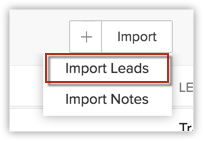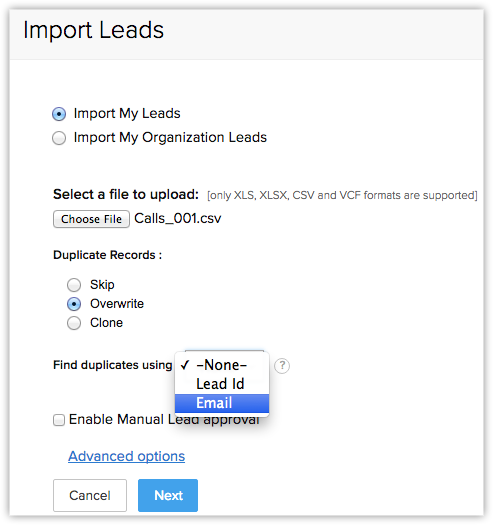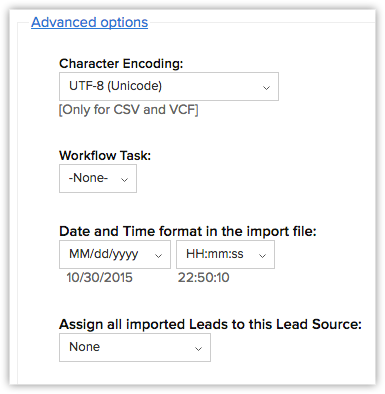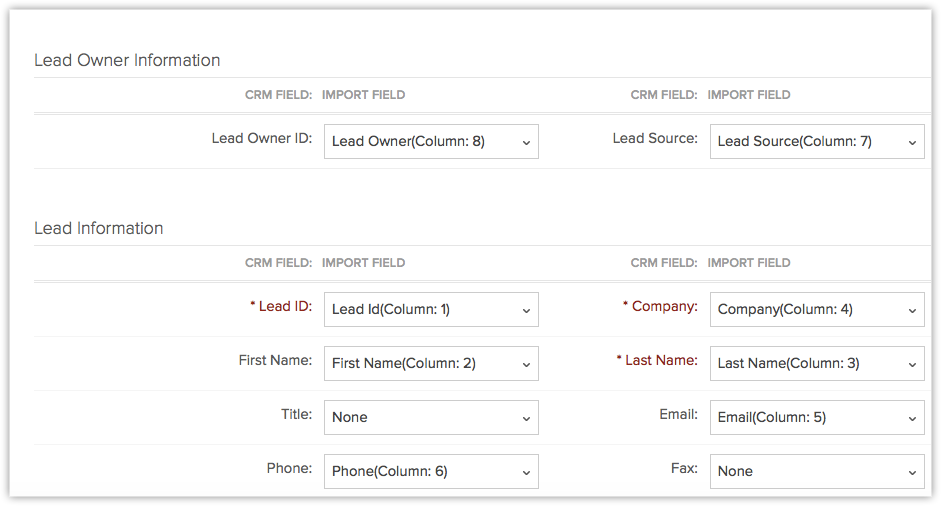Import Data
Use the Import My [Records] feature to import the records owned by (assigned to) you. By default, the records' ownership is automatically assigned to the user who imports the records.
Use Import My Organization [Module] feature to import all the records that are owned by (assigned to) the users in your organization, including the records owned by you. While importing, the import file should have a column that contains the exact email address of the users to whom you want to assign each record. Only then will the records automatically get assigned to the respective users while importing.
Note
- Module refers to the different tabs. For example, Leads, Contacts, Accounts, etc.
To import data
- Click the [Module] tab.
Module refers to the tabs like Leads, Contacts, Accounts, etc. - In the [Module] Home page, click Import [ Module ].

- In the Import [Module] page do the following:
- Choose Import My [Records] or Import My Organization [Records].
- Browse to locate and select the required file that is to be imported.
- Select the check box to Enable Manual Lead approval.
The records will be manually approved by the admin before being assigned to specific users. This option is available only while importing leads. See Also Approve Records
- Select Skip, Overwrite or Clone for duplicate records. (Refer notes below)
The skip and overwrite option is available only in the Paid Editions.
- Choose a field from the Find duplicates using picklist field. (Refer notes below)
The field you choose here will be used by Zoho CRM to compare the existing records with those in the import file. On identifying matching records, Zoho CRM will reject, overwrite or duplicate the records based on your choice.
See also: How to mark a field as a Unique Field - Under Advanced Options, do the following:
- Select the Character Encoding from the list.
- Select a Workflow Task, if required.
Note, that the work flow task will be available in the list only if you had already created a work flow task.
- Choose the Date and Time format for the date and time values in the import file.
- Select a rule from the drop-down list to Assign [Record] Owner as per the Assignment Rule. This option is available only when you Import Organization's record.
Based on the rule, records will be assigned to the users. With assignment rules you can implement theRound Robin method to assign records to the users. See Also Assignment Rules - Select an option from the list to Assign all imported Leads to this Lead Source.
This option is available only while importing leads. - Click Next to continue.
- In the Map Fieldssection, do the following:
- Associate the fields in CSV/XLS file column header with the corresponding [Module] fields in Zoho CRM.
(Mandatory fields should be properly mapped)
- Click Next to continue.
- Associate the fields in CSV/XLS file column header with the corresponding [Module] fields in Zoho CRM.
- In the Confirm Mapping section, verify whether all fields are mapped correctly.
- Click Import.
When the process is over, the added, updated and skipped records will be listed for your reference.
Note
- When you import records to a module, the fields that have been marked as "Unique" for that module are listed in the Find duplicates using picklist field. The chosen field will be used bu CRM to manage duplicate records during import by comparing the existing records in CRM with those in the import file. For example, if you choose the Social Security Number as the Unique field while importing leads, CRM will use this field to compare existing leads with those in the import file. When it finds matching records, one of the following actions will be executed based on your choice under the Duplicate Recordssection.
- If you have chosen Skip, the matching records in the import file will not be added in CRM. Thus a duplicate record is avoided.
- If you have chosen Overwrite, the matching records in CRM are updated and any new records from the file are added. Thus your records are kept up to date.
- If you have chosen Clone, the new record from the import file is added again. Thus your database has copies of the same record.
- Select the [Module ID] from the Find duplicates using field, if and only if you are re-importing the records that were exported from CRM. The [Module ID] field is generated by CRM and is therefore unique to CRM. Hence it is ideal to choose this as a unique field in cases when you want to export a set of records from CRM to a spreadsheet, make some changes to it and import the records again. In this case, when you choose the [Module ID] as the unique field and choose to overwrite the records, the matching records are seamlessly updated. Choosing the [Module ID] as a unique field in any other case may cause duplication of records.
- The unique fields are NOT case sensitive. That is, if the unique field's value in the import file is "ABC" and in the existing record, it is "abc",CRM will still identify this as a match.
- Once the Import process begins, you cannot cancel it and the manual approval option is available only while importing leads.
- If you select a workflow task while importing, the Notify Assignee option in the selected workflow task, will not be applicable.
- In the Free Edition, only the Clone option is available.
- The option to clone, skip and overwrite records is available in the Professional & Enterprise Edition. The skip and overwrite options can be used only if the import file is in CSV format with not more than 5000records per batch.
- For instance, there are two records namely, A and B in your Zoho CRM account. You want to import records B and C.
When you select:
| Record C | Record B | |
| Skip | Imported | Not imported, as it already exists in CRM. |
| Overwrite | Imported | Imported. If the mapped fields' values differ in the existing record, they are replaced with the ones in the import file. Additional new data is added to the record, if the related field is mapped before importing. |
| Clone | Imported | Imported and another record B is created along with the existing one. |
- When the Overwrite option is selected, the duplicate records will be identified based on some fields for each type of record. Following are the fields for each type of record:
- Leads - Email
- Contact - Email
- Account - Account Name
- Potentials - Potential Name
- Cases - Subject
- Solutions - Title
- Campaigns - Campaign Name
- Vendors - Vendor Name
- Products - Product Name
- When the above mentioned fields are not mapped, duplicate records will not be identified, causing duplicates to be created in CRM.
- In case of duplicate records, only the fields that are mapped will be overwritten.
- When you do not use the above mentioned fields and still want to check for duplicate records while importing, then you can use the Record ID. Each record in CRM has a unique ID. When you export the records, you can get their individual Record IDs. See Also Knowledge Base
Related Articles
Import Data
To import data Click the [Module] tab. Module refers to the tabs like Leads, Clients, Accounts, etc. In the [Module] Home page, click Import [ Module ]. In the Import [Module] page do the following: Choose Import My [Records] or Import My ...What are the things I need to check before I import data?
Before you import you data, it is recommended that you test your import with a sample file. Please go through the ckecklist to make sure you import your data properly. Related Link Import Data to CRMExport Data
The Export Data feature allows you to export data (in CSV format) from individual CRM modules. After exporting the data, you can further validate or store the data in your own server(s). Note Module refers to the different tabs. For example, Leads, ...Import Limits
If the import file is in XLS, XLSX or VCF format, you can import a maximum of 1500 records/batch. Records more than 1500 can be imported in CSV format. Check the Feature Availability table for Import Limits. Note The supported formats are Excel (XLS, ...Creating Data Sharing Rules
This feature helps you to create rules to provide access or restrict users from viewing your data in various modules. Availability Profile Permission Required: Users with the Manage Data Sharing permission can access this feature. To create data ...